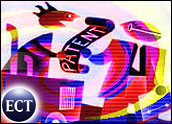
Wikileaks.org won a reprieve Friday from a judge’s order that had shut down its U.S. site for more than a week. U.S. District Court Judge Jeffrey White lifted the injunction he had previously imposed to keep the site from spreading possible trade secrets. He issued the new ruling after he heard a fresh round of arguments Friday.
The clerk’s office of the U.S. District Court in San Francisco confirmed that White issued an amended bench order in the case after a three-hour hearing, but declined to provide details until his written order is released.
The new order reportedly lifts the ban on Wikileaks, enabling it to resume normal operations.
Free Speech Arguments
On Thursday, the AmericanCivil Liberties Union and the Electronic Frontier Foundation filed a motion to intervene in the case, saying the judge’s originalorder violated First Amendment protections of free speech.
The judge heard arguments from those groups, as well as from Wikileaks, on Friday. Wikileaks had not been involved in the original hearing, which ended with Whiteordering hosting company Dynadot to shut down the site and lock the domain toprevent it from being transferred to another provider. (As of press time, Wikileaks.org was not yet up and running; however, it was mirrored elsewhere.)
The controversy began when Bank Julius Baer, one of the largest Swiss banks,asked the court to intervene to stop the dissemination of scores ofdocuments that had been posted to the site by a former employee whoclaimed they showed a pattern of money-laundering activity.
Deep Pockets
Before Friday’s Wikileaks hearing, the ACLU said it planned to argue that theoriginal order failed to consider the public interest. “The public has aright to receive information and ideas, especially ones concerning thepublic interest,” said Aden Fine, a senior staff attorney with theorganization’s First Amendment Working Group. The original injunction,he added, “ignores that vital First Amendment principle.”
Wikileaks was founded to enable easy distribution of whistle-blowerinformation and it has published thousands of documents related toissues such as prisoner treatment at Guantanamo Bay, Cuba, and politicalcorruption in Africa.
Before the ACLU and other joined the cause, Dynadot did not appear prepared to invest the resources necessary to fight the bank’s efforts to force it to shut down the site, said Mark McCreary, an attorney with Fox Rothschild.
In fact, Dynadot agreed to the injunction request that White’s first ruling endorsed, essentially “bowing to the pressure rather than expending the resources and money to fight on behalf of Wikileaks,”McCreary said.
At the very least, the first order appeared hasty, given that Wikileaksclaimed it did not have an opportunity to appear at the hearing afterwhich the judge approved the agreement that shut down the site. White onFriday reiterated that Wikileaks had been served notice of the hearingand did not respond in a timely manner; the Web site claims it learnedof the proceedings just hours before it took place.
Whatever the exact details, “this appears to be a case of veryaggressive actions being taken by a host provider” with tacit agreementfrom the court, McCreary added.
The ACLU and its allies took aim at several parts of the bank’s case,including jurisdictional issues — Wikileaks is not based in the U.S.and therefore cannot be controlled through U.S. courts, their briefargued — and procedural ones.
Questions and Answers
Ahead of the hearing, White issued a list of questions he would giveattorneys an opportunity to answer, including what the basis for thecourt’s jurisdiction would be and whether Dynadot qualified to beconsidered an “interactive computer service,” a designation that wouldgive it immunity from liability under the Digital Millennium Copyright Act.
Another question reads: “Without Wikileaks making an appearance, wasthere any more narrowly tailored remedy for protecting privateinformation from stolen documents from the web site beside locking anddisabling the web site until such time as the disputed documents wereremoved or redacted?”
That question signaled a possible compromise. Reports on the hearing before White issued his order suggested the judge seemed to be leaning toward an amended order, a possible sign that the First Amendment arguments resonated with him.
The first order appeared to be based on finding the fastest and surestway of stopping any dissemination of possibly revealing trade secrets orpersonal information — the bank claims account and Social Securitynumbers were embedded in the leaked documents — Bart Lazar, an attorneywith Seyfarth Shaw, told LinuxInsider.
The judge may have felt that fast action was needed to ensure that BankJulius Baer was not irreparably harmed before it was too late, Lazaradded, noting that the right to publish freely does not extend to truetrade secrets.
“Once a trade secret starts to be published across the Internet, itloses it protection and it’s value,” he added.











































